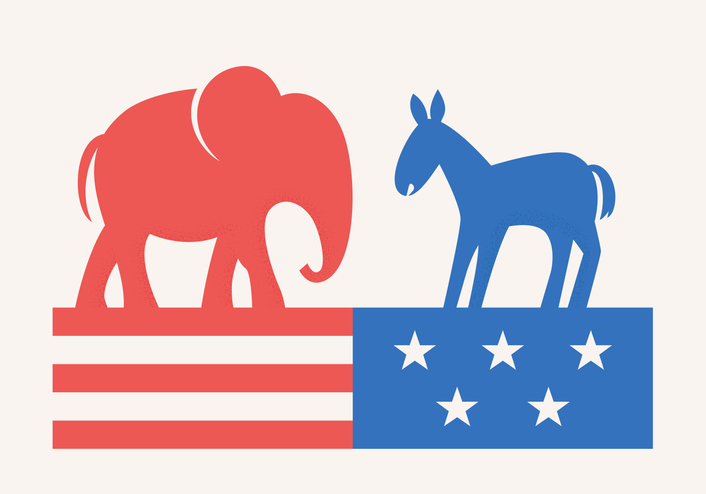A conservative, to paraphrase and slightly alter Irving Kristol’s saying, is a liberal who has been mugged by reality — especially by a reality that is plain to the vast bulk of ordinary people but remains inexplicably invisible to liberal intellectuals and politicians.
That saying applies, to varying extents, to two important political figures who died earlier this month. Both started off as liberals in the 1970s and ended up taking conservative stands on important issues. One was the Brooklyn-based urban politics professor Fred Siegel and the other was California political operative Michael Berman, both of whom I was fortunate enough to encounter in my years of observing American politics.
Fred Siegel started off working for the socialist magazine Dissent, founded in the 1950s by Irving Howe and others steeped in Marxist politics and Yiddish literature, and teaching at New York’s Cooper Union.
There he learned how the big-government policies of the New Deal and Mayor Fiorello LaGuardia (1934-45) helped immigrants and minorities move upward. And he saw how the disastrously generous crime and welfare policies of Mayor John Lindsay (1966-73) more than doubled crime and welfare dependency — bankrupting the city government as nearly a million New Yorkers moved out.
He told that story, and the similar fates of Los Angeles and Detroit, in his 1997 book “The Future Once Happened Here.” But even as he was writing, he was witnessing and, as a Manhattan Institute scholar, inspiring the turnaround initiated by Mayor Rudy Giuliani (1994-2001), whose police reforms, widely imitated elsewhere, cut murders by more than half and shrunk welfare rolls by 650,000. Those who know Giuliani only from his recent antics should read Siegel’s account in “The Prince of the City” (2004) of his unrelenting persistence that brought about this change over the continuous scorn of The New York Times and other liberal organs.
Siegel put these accounts in historical perspective in his 2014 book “The Revolt Against the Masses: How Liberalism Has Undermined the Middle Class,” which shows how, in the wake of the disasters of President Woodrow Wilson’s progressive politics, the literary and journalistic liberals of the 1920s heaped scorn on the public.
Although New Dealers liked to praise the common man, Siegel showed how this element of snobbery (which I noticed early on) recurs when most people recoil from the negative effects of some liberal policies. It’s a lesson that many these days have forgotten — or need to learn.
Unlike Fred Siegel, Michael Berman left no such written record behind (the Los Angeles Times couldn’t find a picture to run with his obituary) aside from the redistricting maps for California and other states in the cycles following the 1980, 1990 and 2000 censuses. He learned the craft from San Francisco Rep. Phillip Burton (D-CA), who lost a bid for House majority leader by one vote in 1976 and died in 1983 and was succeeded by his widow and, in 1987, by Rep. Nancy Pelosi (D-CA).
Behind the scenes, Michael Berman managed campaigns for Henry Waxman and his brother Howard Berman, UCLA buddies who won Assembly and then congressional seats on the heavily Jewish West Side of Los Angeles and who served 40 and 30 years in Congress.
The so-called Berman-Waxman machine raised money, endorsed candidates and prepared campaign flyers and TV ads for various California Democrats, until in 1992 (the oft-proclaimed “year of the woman”), its two LA-based candidates lost Senate primaries to the Bay Area’s Dianne Feinstein (D-CA) and Barbara Boxer (D-CA).
Michael Berman seldom talked to journalists and almost never emerged from his eternally smoke-filled office, but because I’d followed redistricting closely in “The Almanac of American Politics,” I got to know him in the 1980s. He didn’t make much of a secret that by the early 1990s, he had moved some distance away from liberal Democrats.
Like most people in America, but contrary to most congressional Democrats, he supported the Gulf War in 1990-91 and was an especially big fan of Gen. Norman Schwarzkopf. He was a strong backer of robust responses to the 9/11 attacks as well and didn’t sneer at the average person’s desire to see the United States prevail.
His last hurrah came in the 2000 redistricting cycle, when he was hired with generous fees by incumbents of both parties to redistrict the state’s 53 congressional and 120 legislative seats. He wrote personal notes to each incumbent to explain how he’d drawn their districts. His maps were more geographically regular and politically neutral than those of many supposedly nonpartisan redistricting commissions in later cycles.
Were these two men mugged by reality? Or were they, as I think, more respectful than many of their fellows to the common sense of their fellow citizens?
Michael Barone is a senior political analyst for the Washington Examiner, resident fellow at the American Enterprise Institute and longtime co-author of The Almanac of American Politics.
COPYRIGHT 2023 CREATORS.COM
For more great content from Rights, Justice & Culture News.
For more from The Heartland Institute.
